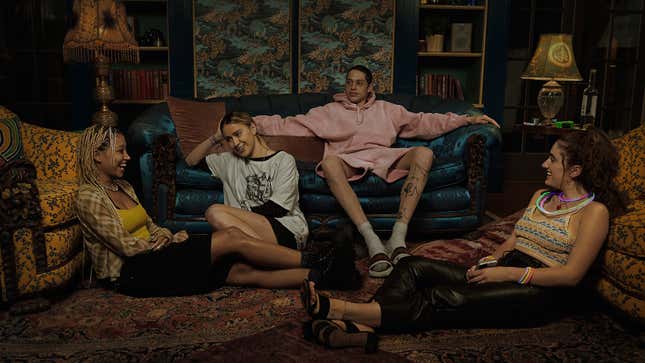‘Bodies Bodies Bodies’ Is a Slasher Flick That Pulls From ‘Heathers,’ ‘Scream,’ and Shakespeare
Director Halina Reijn discusses whether she makes "elevated horror" and how she retooled the original script by Kristen Roupenian (of "Cat Person" fame).
EntertainmentMovies

“Elevated horror?” Halina Reijn doesn’t know her. Though the Dutch actor-turned-director’s English-language directorial debut, Bodies Bodies Bodies, is being released through A24, a company closely associated with the supposed subgenre—it’s put out critical darlings like Robert Eggers’ The Witch and Ari Aster’s Hereditary—Reijn was fuzzy on what it actually means to make “elevated horror.”
“Does that mean like arthouse horror?” Reijn asked during a phone conversation with Jezebel this week.
Uhhh…maybe? Kind of? “Elevated horror” is definitely a thing people talk about, but the label seems more a concern of audiences than filmmakers (unless those filmmakers are making something explicitly meta, like the latest Scream movie, whose characters discuss finer points of the classification). By and large, filmmakers just want to make good movies and possibly put their own stamp on the genre, and that is what Reijn does with Bodies Bodies Bodies, a horror-comedy that works roughly within the realm of the slasher subgenre, with a few major left left turns here and there.
A bunch of affluent Gen Zers (and one “old guy” in his 40s played by Lee Pace) of varying backgrounds and sexualities gather at a mansion in the country for a weekend of hanging, drinking, and drugging. The horror kicks off during a dark and stormy night, when a game of Bodies Bodies Bodies—a cross between Mafia/Werewolf (in which a group has to figure out who among them has been secretly assigned as the killer) and Hide and Go Seek—turns deadly and deadlier still. It’s a simple premise rendered intoxicating by Reijn’s savvy directing and uniformly strong performances across the board, including from Amandla Stenberg, Borat Subsequent Moviefilm’s Maria Bakalova, and Rachel Sennott, who’s an absolute scream as the pseudo-woke Alice.
Reijn said in order to work within the slasher form, she had to make it her own. She did this quite literally, almost completely revising the original Bodies script that “Cat Person” writer Kristen Roupenian sold to A24 in 2018. That script had very little of the syntactic satire of what eventually made it to the screen (via writer Sarah DeLappe, whom Reijn said she worked with to shape the story), though did feature the game at the heart of Reijn’s movie. Reijn told Jezebel that she “loved” Roupenian’s script but “to take slasher film on, it needed to be, you know, more than a fun film with friends playing a game.” (I read a supposed draft of Roupenian’s script I found online before conducting this interview and agree with Reijn’s move to overhaul it. As it was written, it was practically unfilmable.)
In her conversation with Jezebel, Reijn repeatedly referenced her theater background and casually mentioned numerous references she pulled from for Bodies Bodies Bodies: Scream (of course), Heathers, Mean Girls, Lord of the Flies, Reservoir Dogs, Who’s Afraid of Virginia Woolf?, Agatha Christie, John Cassavetes, Ibsen, Shakespeare, and Chekhov. She said that part of what interested her in the movie was that she, too, played what many in America call Mafia or Werewolf (the name of the game in Dutch translates to “Little Murderer”). However, none of her friends died in the process (or if they did, she didn’t mention it). Reijn spoke so quickly that talking to her was like being thrust into an Aaron Sorkin production. Her enthusiasm for what she created was palpable and, in my opinion, well-earned. An edited and condensed transcript of our conversation is below.
JEZEBEL: What drew you to this project initially?
HALINA REIJN: The game. I used to have a very tight friend group. Now they all have children, so they don’t call me anymore. But we used to be so close, like a little commune, and we would play this all the time. I would hate it. I would hate every minute of it. It was psychological warfare, but it was also exciting. It was kind of sexy.
A24 gave me total freedom and they gave me Sarah DeLappe, who was a playwright, and me coming from a theater, that was like love at first sight. We started to jam and make this Chekhov meets Mean Girls meets Lord of the Flies.
-

-

-

-

-

-

-

-

-

-

-

-

-

-

-

-

-

-

-

-

-

-

-

-

-

-

-

-

-

-

-

-

-

-

-

-

-

-

-

-








































